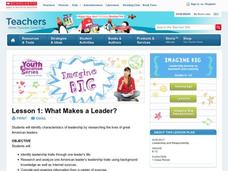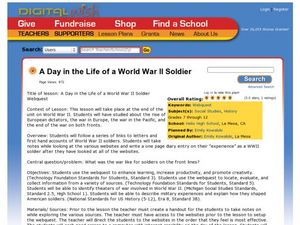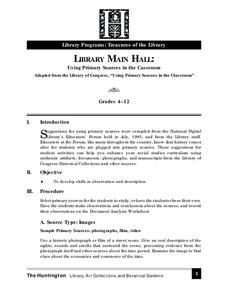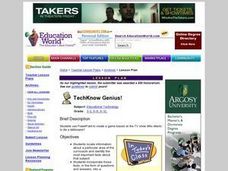Curated OER
Hidden Children
Eleventh graders explore, analyze and study a specific genocidal event in twentieth-century history, The Holocaust. They evaluate a variety of historical artifacts and synthesize the information gathered into their own in order to...
TED-Ed
A Digital Reimagining of Gettysburg
Why would Robert E. Lee order Pickett's Charge, an action that changed the course of the Civil War? Geographer and historian Anne Knowles uses digital technology to explain what she thinks is the missing piece in trying to understand...
Museum of Tolerance
Influence of Media
We are bombarded with media images expressly designed to influence viewers. Learning how to analyze the intended effects of these images is essential and the focus of an activity that asks viewers to use the provided questions to guide...
Media Education Lab
Sponsored Content as Propaganda
What is sponsored content? Who produces sponsored content? Why? Is it fair or unfair? What are the privacy implications for consumers? To answer these questions, class members view a model screencast before crafting their own that...
Advocates for Human Rights
The Rights of Women in the United States
Six diverse activities make up a substantial unit on the women's rights movement in the United States, past and present. A few of the topics at hand: the fourteenth and nineteenth amendments, the Equal Pay Act, the Lily Ledbetter Act,...
Scholastic
What Makes a Leader?
After creating a list of great American leaders from the last century and researching their lives, pupils will brainstorm aspects of leadership and discuss what traits may be shared by all leaders.
Newseum
The Medium Shapes the Message
Where do you get your news? Have learners examine four different publications and decide which one they would choose to read on their own time. The resource includes a list of publication types to supply and a worksheet for groups to...
Curated Video
Detecting Lies & Harmful Links
Who and what can you trust online? How do you know? After viewing a pair of introductory videos on positive and safe online conduct, learners discuss the content and put it into practice during an online search activity about alien life.
Population Connection
The Human-Made Landscape
Agriculture, deforestation, and urbanization. How have human's changed the planet and how might we mitigate the effects of human activity on the planet? To answer these questions class members research the changes in human land use from...
Museum of the Moving Image
What Makes an Effective Ad?
As an introduction to a series of related resources that examine political advertising and commercials from 1952-2012, class members use the provided rubric to analyze and rate the effectiveness of the emotion, persuasion, factual...
Museum of the Moving Image
Evaluating Information: Focus on the 2008 Election
Just how true is the information contained in political ads? Determining the veracity of campaign ads from the 2008 presidential race is the focus of a lesson that introduces class members to several fact-checking resources.
Museum of the Moving Image
Developing Critical Analysis
To gain an understanding of how images and sounds are used to influence viewers, class members analyze these features in Presidential campaign commercials from 1952-2012.
Museum of the Moving Image
Political Ads in Historical Context
Campaign ads target both timely issues and general themes. Presidential campaign ads from 1952 and 1988 provide class members an opportunity to compare how the topics ads choose to address can dramatically influence election outcomes.
Library of Congress
Industrial Revolution
Could you live without your phone? What about cars, steel, or clothing? Class groups collaborate to produce presentations that argue that either the telephone, the gramophone, the automobile, the textile industry, or the steel industry...
Southern Poverty Law Center
Evaluating Online Sources
All sources are pretty much the same, right? If this is how your class views the sources they use for writing or research projects, present them with a media literacy lesson on smart source evaluation. Groups examine several articles,...
Curated OER
A Day in the Life of a World War II Soldier Webquest
Students complete a web-quest into a day in the life of a World War II soldier. In this webquest lesson, students investigate what life was like for soldiers on the front lines during the second World War. They use note taking skills...
Media Smarts
Bias in News Sources
As young consumers of media, it is important for high schoolers to explore concepts of bias and prejudice, and how they may be present in media. After discussing ideological messages that media can contain, individuals complete a warm-up...
Curated OER
Using Primary Sources in the Classroom
Scholars study a historical photograph to make predictions of what happened right after the picture was taken. They research a variety of different topics and use primary sources to answer questions about common food, fashion trends, and...
Curated OER
TechKnow Genius!
Students utilize PowerPoint to create a game based on the television game show "Who Wants to Be a Millionaire." They research information about a particular area of study and identify the most important facts about the subject to create...
PBS
Journalism Ethics
As a journalist, would you publish everything you heard or saw? Discuss the ethics of journalism with a lesson from PBS. Young reporters imagine themselves to be the editor of their school's newspaper, and as they read five scenarios,...
Overcoming Obstacles
Giving Presentations
With their action plans in place, groups now develop a presentation to get others interested in their project. Scholars learn how to present themselves during a presentation and elaborate on and add visuals to their presentation. After...
PBS
Amid Rising Economic Inequality, Does America Need a Third Reconstruction?
Young political scientists investigate the Poor People's Campaign protest held in Washington, D.C., on June 18, 2022. They research how the event was reported in various news outlets and consider their stance on whether "poverty is...
Curated OER
Olympic Challenge
Have your class research a country related to the Olympics. They participate in physical education activities included in the Presidential Physical Fitness Test and write about their country. This is a very interactive plan.
Habits of Mind
Haileybury Habits of Mind Learning Resource Book
Imagine a learning community committed to using Costa and Kallick's Habits of Mind as the basis of curriculum design. The resource book is packed with lessons that are designed for and identify the standards and habits of mind targeted...
Other popular searches
- Social Skills Lesson Plans
- Autism Social Skills
- Personal Space Social Skills
- Social Skills for Teens
- Current Events Social Skills
- Social Skills Adolescents
- Social Skills Lessons
- Social Skills Games
- Team Building Social Skills
- Circle Time Social Skills
- Teaching Social Skills
- Cooperation Social Skills

























